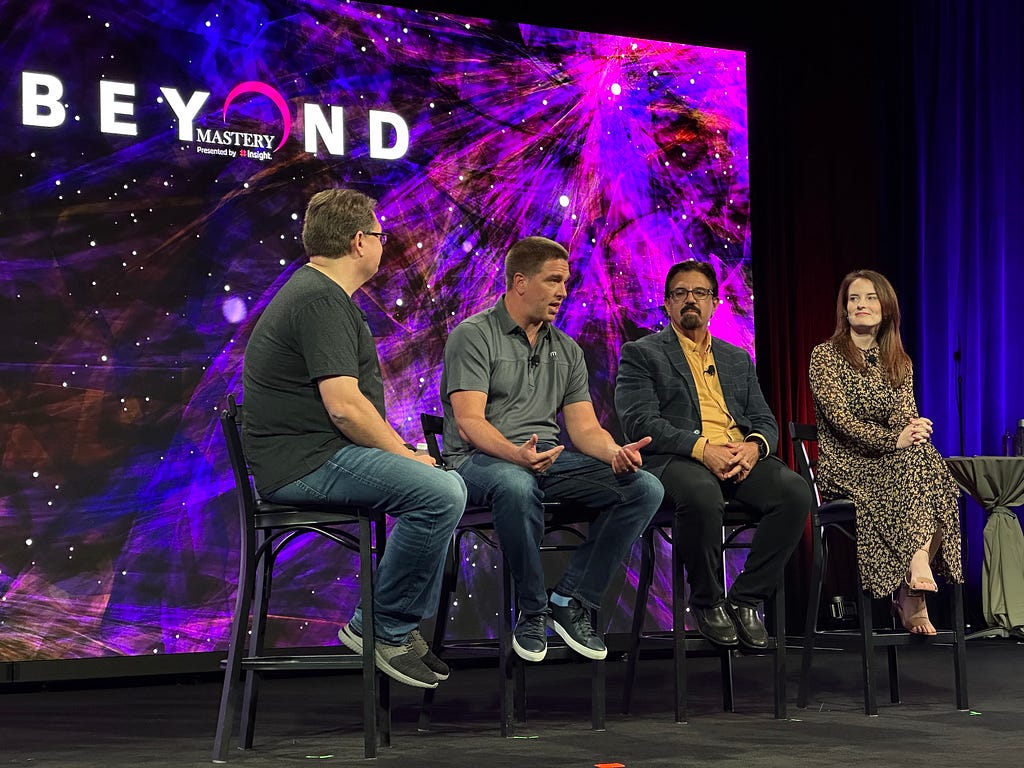Meagan Gentry of Insight Enterprises On Five Things You Need To Create A Highly Successful Career In The AI Industry

Practicing clear communication. I can’t emphasize enough how important it is to be an effective communicator. Particularly when it comes to AI — a burgeoning field where many people may not understand all the intricacies — teammates have to be on the same page. That means they need to have a clear understanding of the goals they’re trying to achieve and be able to interpret the business problem they’re trying to solve correctly. Otherwise, it’s easy for things to get lost in translation and for developers to build something that doesn’t meet a client’s specific needs. Communication is key.
Artificial Intelligence is now the leading edge of technology, driving unprecedented advancements across sectors. From healthcare to finance, education to environment, the AI industry is witnessing a skyrocketing demand for professionals. However, the path to creating a successful career in AI is multifaceted and constantly evolving. What does it take and what does one need in order to create a highly successful career in AI?
In this interview series, we are talking to successful AI professionals, AI founders, AI CEOs, educators in the field, AI researchers, HR managers in tech companies, and anyone who holds authority in the realm of Artificial Intelligence to inspire and guide those who are eager to embark on this exciting career path.
As part of this series, we had the pleasure of interviewing Meagan Gentry, National AI Practice Manager of Insight Enterprises.
Meagan Gentry is the national AI practice manager at Insight. Her team specializes in delivering end-to-end data science and machine learning solutions to clients, including acceleration of AI centers of excellence, MLOps and more.
Thank you so much for joining us in this interview series! Before we dive in, our readers would like to learn a bit about your origin story. Can you share with us a bit about your childhood, how you grew up, and how you decided to pursue a career path in AI?
I grew up in the foothills of North Carolina in a small textile millwork town. My childhood in Appalachia was extremely formative for me. I witnessed various industries boom and fail, and a lot of people I knew and cared about lost their jobs. That had a tremendous impact on me, both personally and professionally. At a young age, I started thinking seriously about how technology would impact employment trends in the U.S. going forward.
Then, when it was time for me to apply to colleges, the 2008 recession hit. Seeing the consequences of that made having a stable job a big priority for me. At the same time, I became increasingly curious about how the world works and how we respond to global changes — I originally thought I wanted to study meteorology (and there was a time where I thought I wanted to be a weather woman!)
I was starting to get the sense that data was the one resource that might actually be infinite. We’ll never run out of data, even as we run out of many other things, and it can always be used as a force for good. As an undergrad, whether I was conducting research on climate initiatives or interning at the EPA, data was ultimately what I was most fascinated by and the profession I ended up gravitating to.
Because I was always interested in figuring out how to use data to identify patterns, make predictions, and mitigate risks, I was introduced to AI and machine learning. I haven’t looked back since.
Can you tell our readers about the most interesting projects you are working on now?
We’re doing a lot of interesting work with generative AI — a type of AI technology that can produce various types of content. This technology is creating exciting, new ways for businesses to gain a competitive edge — it’s here to stay and changing the nature of work as we know it.
One project I’d like to highlight is our work with a Midwest non-profit academic medical center to develop a predictive treatment model that can be used for preventative measures. Essentially, with real-time electronic medical record data, the model can detect sepsis in patients with high accuracy before it becomes a major problem. We’ve also helped that organization interpret spinal imagery data to predict the chances of survival of different spinal surgeries by patient.
Another interesting project is how we’re helping a construction company better understand worker-injury patterns and predict safety incidents in construction zones through the use of generative AI. For background, a project manager on site uses an AI-powered application to log construction activity completed that day. After inputting all the necessary information into the application, the project manager receives a quantified metric assessing how risky the work was — taking into account contributing factors, such as weather, the specific equipment used, or how the equipment was operated. This tool has helped the company continuously update its safety protocols and reduce injury risk for workers.
What I like about both examples is they get to the “meat and bones” of what people do on a daily basis and illustrate how emerging technology can help make everyday tasks more efficient and productive.
Solutions like these are part of a much bigger picture: the capabilities of AI to improve quality of life. In addition to saving lives through predictive warnings of risk, we’re seeing widespread use of AI to change the way we live and work.
I’m really excited about the ways we’re exploring the use of Generative AI to drive efficiencies in our day-to-day operations at Insight, like dynamic contract generation and AI-assisted code development. I can’t wait to see the impact of AI in the workplace and how it will provide opportunities for my teammates to focus less on rote tasks, and instead focus more on creative problem-solving. Our teams are far more fulfilled by discovering new solutions than by fixing trivial bugs or correcting grammar in documents. We spend roughly half of our waking hours each day working, so I’m always looking for ways we can optimize our hours at work to be more meaningful.
None of us are able to achieve success without some help along the way. Is there a particular person who you are grateful for who helped get you to where you are? Can you share a story about that?
The first person that comes to mind is my mother, who taught me from a young age the importance of discipline and education. I believe that there’s more than one way to get a great education. Formal degree programs can be a powerful tool for career development, but they aren’t always affordable or flexible enough for many people’s lives. I’ve adopted a philosophy of ‘I can learn something from everyone and I can learn it anywhere‘. I have found that building a habit of regular reading and listening to a variety of sources (including conversations with smart people), combined with keeping steady but slow progress on a hands-on project, is a sustainable way to keep growing.
One of my former colleagues, Kristina Heinz, has also always been a special mentor of mine. She taught me how to communicate effectively with clients, particularly when it comes to distilling technical concepts into something comprehensible.
Ok, let’s now move to the main part of our interview about AI. What are the 3 things that most excite you about the AI industry now? Why?
What excites me the most about AI is its potential to do good, particularly from an accessibility perspective. There are so many tools at developers’ disposal — from open-source AI projects to publicly available LLMs. A developer that can properly utilize all the resources currently available can create applications in record times. As a result of this accessibility, a developer can easily deliver the goodness of technology to help others. This excites me particularly because it is now easier for developers to give back to the communities that built them up with side projects in their spare time. Traditionally, they would have had to instead work at companies dedicated to those causes and forgo the benefits of working for established players in tech.
Another exciting component around generative AI specifically is the enormous potential for productivity gains given its remarkable ability to autonomously create content. Businesses and individuals alike are exploring how it can automate and streamline tasks that once required extensive manual labor. From generating natural language text to crafting intricate designs, generative AI systems can significantly accelerate creative and data-driven processes. By harnessing the power of these AI models, organizations can enhance their efficiency, reduce costs, and unlock new possibilities for innovation.
Moreover, as generative AI continues to advance, it has the potential to democratize access to creative tools, enabling a broader spectrum of people to participate in content creation and problem-solving, thereby fostering a more inclusive and productive future. This will lead to both increased diversity in STEM, as well as new perspectives from professionals within the new fields where its use is being explored.
What are the 3 things that concern you about the AI industry? Why? What should be done to address and alleviate those concerns?
When it comes to some of the systems we interact with every day, such as recommendation algorithms on media apps or targeted ads in stores, we don’t always know that we’re looking at something with an AI system behind it. The risk there is you have less agency over your own choices as a consumer. One way for organizations to ensure consumers are informed about when they’re using AI is adopting a responsible AI framework to check at multiple levels of development that they’re doing the right thing for their users. We do this at Insight, leaning on a collection of frameworks to scan for vulnerabilities at different stages of AI development. When an idea strikes, when that idea gets placed in the backlog for discovery, during the data analysis and model design phase, and when we’re about to promote and release it to a testing and production environment — at each of these stages we conduct scans to identify the risks.
Something else we need to be aware of is AI’s ability to amplify bias, which is really hard to detect in data sometimes — and even harder to remove. We have a lot of data in our world with particular patterns associated to certain demographic groups that isn’t always helpful to use when training models. Data with that type of bias will have biased outputs, leading to poor outcomes for users. To avoid this, it’s always important to have a human in the loop. Someone who is acting in the best interest of the consumer should be present to check the data fed to AI systems and oversee their outputs.
Lastly, another glaring concern is intellectual property and copyright risk. Generative AI blurs the lines of content authorship, potentially leading to disputes over ownership and infringement — do you own an output if you used copyrighted material to generate it? To mitigate this, clear legal frameworks need to be established, defining the rights and responsibilities of AI developers, users, and content creators. Companies should adopt transparent policies regarding AI-generated content, and copyright laws may need to evolve to accommodate these new challenges. Additionally, watermarking or metadata can be used to indicate AI-generated content, aiding in attribution and enforcement of copyrights.
For a young person who would like to eventually make a career in AI, which skills and subjects do they need to learn?
It’s important to remember that AI isn’t something that’s just tucked away in the back offices of organizations. The technology doesn’t exist in a vacuum. Instead, it’s integrated into every aspect of our lives — from healthcare to language to law to government. So, skillsets beyond “the basics” (like software, engineering, and analytics) are not just helpful, but they’re necessary.
For instance, aspiring AI professionals can benefit from having strong communication skills. Storytelling to get your point across is incredibly powerful. As part of being a good communicator — particularly if you hope to work with clients and learn how to best solve their needs — it’s important to understand the economics of building AI models. Having the technical knowledge is critical but that’s not the entire picture. These models are costly. Knowing how to scale operations so they compute in a cost-efficient manner is something companies will likely want to see, too.
As you know, there are not that many women in the AI industry. Can you advise what is needed to engage more women in the AI industry?
What’s encouraging is there are more publicly available resources than ever before, so more and more people can engage with the technology. I firmly believe having professionals with different backgrounds and skill sets — meaning those who aren’t necessarily as “technical” or with a traditional STEM background — working in the AI industry is essential.
For example, AI is closely linked to the future of the K-12 education and childcare space — both as a teaching tool and as a catastrophic cheating mechanism. So, an educator has a unique perspective to share regarding how AI can (and should) be incorporated in the classroom. Organizations can benefit from bringing in more specialists — like educators — who can weigh in on AI product design, beyond developers. I believe that can further help with promoting inclusivity in the space.
Ethical AI development is a pressing concern in the industry. How do you approach the ethical implications of AI, and what steps do you believe individuals and organizations should take to ensure responsible and fair AI practices?
Companies need to be proactive about enabling this technology among employees.This starts by developing a framework and policy to create guardrails for testing and learning to minimize security risks. As AI continues to evolve, an AI governance framework — that is regularly updated and well-understood by the entire organization — is essential.

Ok, here is the main question of our interview. Can you please share the “Five Things You Need To Create A Highly Successful Career In The AI Industry”? If you can, please share a story or an example for each.
- Practicing clear communication.
I can’t emphasize enough how important it is to be an effective communicator. Particularly when it comes to AI — a burgeoning field where many people may not understand all the intricacies — teammates have to be on the same page. That means they need to have a clear understanding of the goals they’re trying to achieve and be able to interpret the business problem they’re trying to solve correctly. Otherwise, it’s easy for things to get lost in translation and for developers to build something that doesn’t meet a client’s specific needs. Communication is key.
2. Strengthening your foundational data science background.
Having proficiency in data analysis along with statistics is essential for developing LLMs. This serves as the foundation for software engineers to grasp the integration of various components when constructing AI products.
3. Understanding the economics of AI.
In the early stages of my career, I struggled with understanding when I needed to request additional computing resources. I had to navigate the process of determining my specific requirements, estimating the associated costs, and identifying potential sources of support.
Today, things have become somewhat simpler with the advent of serverless computing and the ability to hyperscale with most platforms. And now there’s more of an established marketplace for AI models. But acquiring more computing power can still be costly and it’s helpful for people to understand how to select the right models for their desired use-cases. Aspiring AI developers should know when it’s most efficient for them to leverage pre-existing models and allocate more investment to operating costs vs. when they should invest in training and allocate more investment to capital costs(or, perhaps, when a combination of both approaches will be most successful).
4. Experimenting on and building passion projects that are meaningful to you.
I’m a big proponent of setting aside time to build things that matter to you on a personal level and that work to solve problems you’re truly passionate about. Who knows — that invention could be something you could patent for yourself and have intellectual property for the rest of your life!
For instance, I love music and am a huge fan of attending live music events. So, recently I built a tool that notifies me which shows or concerts are happening nearby. What’s cool is these recommendations are all informed by my Spotify listening habits — it’s personalized by me, for me!
5. Pursuing both informal and formal training.
Formal training programs and academic training programs are extremely important. That said, these programs can often be drawn out (and possibly outdated). The landscape is changing quickly, and AI professionals have to be nimble in their learning.
For that reason, it’s important to seek out internet forums convening experts or user groups where people meet up locally. If you’re devoting a certain amount of time a day to keeping your skills relevant, split it between formal training and riffing with other experts in the field.
How can our readers further follow your work online?
Please feel free to connect with me on LinkedIn: https://www.linkedin.com/in/meagan-gentry-4ab92556/.
This was very inspiring. Thank you so much for joining us!
Meagan Gentry of Insight Enterprises On Five Things You Need To Create A Highly Successful Career… was originally published in Authority Magazine on Medium, where people are continuing the conversation by highlighting and responding to this story.
